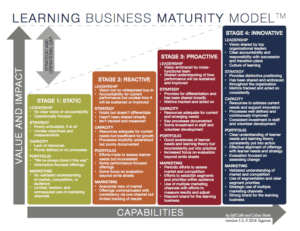As the market for online learning continues to grow to epic proportions, so do the opportunities to connect and engage with learners. And it’s the Big Learning companies that are leading the charge to do this so why not take a page out of their playbooks to see what practices those of us in the business of lifelong learning can try and emulate?
In this episode of the Leading Learning podcast, Celisa and Jeff discuss specific lessons that can be learned from some of the Big Learning companies and how they might be applied to benefit your learning business.
To tune in, just click below. To make sure you catch all of the future episodes, be sure to subscribe by RSS or on iTunes. And, if you like the podcast, be sure to give it a tweet!
Listen to the Show
Read the Show Notes
[00:18] – A preview of what will be covered in this podcast where Celisa and Jeff discuss lessons that can be learned from some of the Big Learning companies.
Note this podcast is based on an earlier blog post, Learning from Big Learning: 14 Lessons.
[00:35] – Highlighted Resource of the Week –Learning Business Maturity Model™ – a free resource designed specifically to help learning businesses of any size reach their full maturity.

MOOCs
[01:14] – Three lessons that can be learned from massive open online courses (MOOC) organizations (such as Coursera or EdX):
- There may be significant opportunity in thinking bigger and broader than you are right now. If you represent a field or industry of any reasonable size, there is almost certainly a large audience out there interested in foundational knowledge, emerging topics, or both.
Dr. Barbara Oakley’s Coursera course, Learning How to Learn has over 2 million learners across the globe is a great example of this.
Check out our recent interview with Barbara, Learning How to Learn with Dr. Barbara Oakley.
- It’s worth exploring what partnerships you could/should be leveraging for broader reach and mutually-beneficial brand building.
- “Free” is powerful. And all the more so if your organization is seen as a valuable source of validation through certifications, specializations, and other forms of credentialing.
Lynda.com
[04:06] – Two lessons that can be learned from Lynda.com, a video-based online education company that was acquired by LinkedIn for $1.5 billion in 2015, are:
- While showing up first is never a guarantee, it almost always gives you a major advantage if you have a reasonably good model and are willing to focus. Most trade and professional organizations are naturally positioned to be first with education in their markets. Are you capitalizing on this position?
- There is deep value to be mined in effectively connecting online education with a network. Or, even better in our view, a community—and membership organizations are, at least in theory, particularly well positioned for creating education-community connections that vastly exceed the sum of the parts.
Khan Academy
[07:11] – Two lessons that can be learned from Khan Academy are:
- You don’t have to have expensive or cutting edge technology to get started. The main thing is to focus on how you can best improve your learner’s situation.
- Everything doesn’t have to be a “course” in the traditional sense. Most Khan Academy videos are in the 5 to 10 minute range and are provided as a learning tool to help learners with a specific, well-defined issue or problem, not as a full-blown educational solution.
Kahn Academy put flipped learning on the map so if you’re not thinking about a course and you’re thinking more about learning assets which can help students prepare for or serve as a supplement to a course, you have even more opportunity with this.
Also note that these videos are what many people have come to consider the prototype of microlearning,
The Great Courses
[10:39] – Three lessons that can be learned from The Great Courses, a company that focuses on lectures are:
- While lectures are most assuredly overused, and often done badly, they are hardly a thing of the past. Used in the right way, they can be extremely valuable, and many – probably most – learners actually like a good lecture.
- Actively scouting, engaging, and cultivating teaching talent is one of the most essential and strategic functions of an education business these days. It’s worth reviewing – and, most likely, improving – your efforts in this area regularly.
- Put your money and your service where your mouth is—offer a money back guarantee. The number of people who take you up on it will be small, but it lowers risk, thus helping with converting prospects to customers . And it creates good will.
Here is a link to read about Great Courses money back guarantee.
Note that Great Courses has also invested in service by instituting a “course knowledge” component to their service training. All of their customer service representatives now keep a “course knowledge” notebook so they can talk with customers in a substantive, meaningful way about courses.
See also this episode with Monisha Pasupathi, instructor for The Great Courses How We Learn course.
Udemy
[15:00] – Udemy, whose business model is the Market Maker model, provides tools and a process that makes it easy for subject matter experts to create and offer their own learning experiences. Two lessons to be learned from them are:
- If you have not thought about how your organization might embrace some variation of the Market Maker model, now is the time. Note that Udemy was among the first in their market to do what they did—a “blue ocean” move.
See our recent podcast episode, Blue Ocean Strategy for Your Learning Business.
- Regardless of the above, investing in systematically supporting your experts in delivering great content is a smart move (and that goes for the classroom/breakout session room as much as it does for online).
Degreed
[18:38] – Degreed is not really a content creator, but rather an aggregator of content and – more importantly – an aggregator of learner records. Note that we coined the term “learning locker” to describe this approach—basically, a place where learners can record and keep track of all of their various learning activities, formal or informal, no matter where they take place. Two lessons to learn from them are:
- Really give informal learning its due. If you aren’t giving credit for the informal learning that your members and your learners are doing, that can be dangerous. Think about what types of informal learning you’re offering and be focused and strategic about it since the vast majority of learning happens informally.
- Being the place where learners come to track their learning and access content is a potentially powerful move.
See our interview with Degreed CLO Kelly Palmer.
[22:29] – We aren’t saying to offer everything mentioned but the main takeaway is there are lessons to be learned from all of these organizations. Just think about them and see which ones fit and apply to your learning business.
[23:05] – Wrap Up
Comment on this post below to let us know any lessons you’re getting from the companies discussed here (or others you’d consider Big Learning).
If you are getting value from the Leading Learning podcast, be sure to subscribe by RSS or on iTunes. We’d also appreciate if you give us a rating on iTunes by going to https://www.leadinglearning.com/itunes.
Also, consider telling others about the podcast. Go to https://www.leadinglearning.com/share to share information about the podcast via Twitter, or send out a message on another channel of your choosing with a link to https://www.leadinglearning.com/podcast.
[25:31] – Sign off
See Also:


Leave a Reply